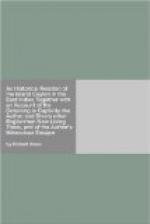[The lower ranks may not assume the Habit or Names of the higher.] All below the Couratto or Elephant-Men, may not sit on Stools, nor wear Doublets, except the Barbar, nor wear the Cloth low down their Legs. Neither may any of these ranks of People, either Man or Woman, except the Potter and the Washer, wear the end of their Cloth to cover their Bodies, unless they be sick or cold. Neither may they presume to be called by the Names that the Hondrews are called by; nor may they, where they are not known, change themselves by pretending or seeming to be higher than Nature hath made them: and I think they never do, but own themselves in the rank and quality wherein they were born, and demean themselves accordingly.
All Outlandish People are esteemed above the inferior ranks. The Names of the Hondrews always end in oppow, of others below the degree of the Elephant People in adgah.
[Slaves.] The Slaves may make another rank. For whose maintenance, their Masters allow them Land and Cattle. Which many of them do so improve; that except in Dignity they are not far behind their Masters, only they are not permitted to have Slaves. Their Masters will not diminish or take away ought, that by their Diligence and Industry they have procured, but approve of it, as being Persons capable to repose trust in. And when they do buy or otherways get a new Slave, they presently provide him a Wife, and so put him forward to keep House, and settle, that he may not think of running away. Slaves that are born of Hondrew Parents, retain the Honour of their degree.
[Beggars.] There is one sort of People more, and they are the Beggars: who for their Transgression, as hereafter shall be shewn, have by former Kings been made so low and base, that they can be no lower or baser. And they must and do give such titles and respects to all other People, as are due from other People to Kings and Princes.
[The Reason they became so base and mean a People.] The Predecessors of these People, from whom they sprang, were Dodda Vaddahs, which signifies Hunters: to whom it did belong to catch and bring Venison for the King’s Table. But instead of Venison they brought Man’s flesh, unknown; which the King liking so well, commanded to bring him more of the same sort of Venison. The king’s Barbar chanced to know what flesh it was, and discovered it to him. At which the King was so inraged, that he accounted death too good for them; and to punish only those Persons that had so offended, not a sufficient recompence for so great an Affront and Injury as he had sustained by them. Forthwith therefore he established a Decree, that all both great and small, that were of that Rank or Tribe, should be expelled from dwelling among the Inhabitants of the Land, and not be admitted to use or enjoy the benefit of any means, or ways, or callings whatsoever, to provide themselves sustinence; but that they should beg from Generation to Generation, from Door to Door, thro the Kingdom; and to be looked upon and esteemed by all People to be so base and odious, as not possibly to be more.




